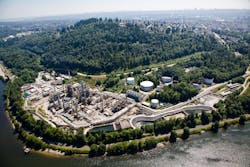Parkland wraps refinery turnaround, cancels renewables complex
Calgary-based Parkland Corp. has completed an 8-week planned maintenance event at subsidiary Parkland Refining (B.C.) Ltd.’s 55,000-b/d refinery on Burrard Inlet in North Burnaby, near North Vancouver, BC. (OGJ Online, Feb. 1, 2023).
The turnaround, which began on Feb. 1, was safely completed on time and within budget, with the refinery returned to full operations as of Apr. 11, Parkland said.
While the operator previously confirmed scheduled maintenance event was to involve the temporary shutdown of unidentified process units to enable cleaning, inspection, and routine servicing of equipment, Parkland revealed in its latest annual report released to investors in late March that the first-quarter 2023 turnaround specifically included the following:
- Regular maintenance and inspections of the refinery’s crude, reforming, and distillate hydrotreating units.
- Catalyst changes on the reforming and distillate hydrotreating units.
- Unspecified reliability and capital improvements associated with the site’s coprocessing of renewable feedstocks.
In its 2023 guidance issued in early December 2022, the company said the first-quarter 2023 turnaround would require an estimated $100 million (Can.) to complete.
In an early March 2023 call with investors, Bob Espey, Parkland’s president and chief executive officer, confirmed the Burnaby refinery’s next planned turnaround is scheduled to take place in 2025.
Standalone renewables project
Completion of the 2023 turnaound follows Parkland’s confirmation in March that it has decided not to proceed with a previously announced plan to build a grassroots, standalone 6,500-b/d complex for production of renewable diesel at the Burnaby refinery (OGJ Online, May 13, 2022).
“Following the announcement of the renewable diesel project last year, several factors have impacted its competitiveness,” Espey told investors in a Mar. 3 quarterly earnings call with investors.
Specific reasons Parkland cited for the project’s cancellation included rising project costs, lack of market certainty around emerging renewable fuels, and the US Inflation Reduction Act (IRA) of 2022, the latter of which advantages US producers by providing longer-term policy certainty and incentives for investing in renewable fuels-production projects, according to the operator.
Espey identified the IRA as the biggest change for Parkland’s business in the renewable space following the operator’s initial announcement of the then-proposed Burnaby renewable diesel complex.
“Our view is that there’ll be a lot of [renewable production] capacity coming on, and the markets will likely go long. And the best position to be in is being a buyer in that market,” Espey said.
While Espey said Parkland currently does not have plans to invest in further projects that would add renewable diesel capacity, the operator nonetheless remains committed to continue expanding the Burnaby refinery’s capability to coprocess renewable feedstocks for production of drop-in renewable gasoline, diesel, and jet fuel products.
During 2022, a series of debottlenecking works enabled the refinery to increase coprocessing volumes of Canadian-sourced biofeedstocks—including canola oil, tallow and tall oil (a by-product from the pulp and paper industry)—by 30% to more than 2,000 b/d, Marcel Teunissen, Parkland’s chief financial officer, told investors in March.
Alongside undertaking ongoing debottlenecking works to boost Burnaby’s coprocessing volumes to a targeted 5,500 b/d, Parkland said it also is exploring expanding the refinery’s slate of potential renewable feedstocks to include other forest residuals, wastewater biomass, and carbon-capture liquids.
Parkland’s proposed coprocessing plans at Burnaby collectively come as part of the operator’s commitment to furthering both the province and Canada’s transition to lower-emission fuels and a lower-carbon economy, as well as the country’s national ambition to achieve net-zero emissions by 2050 in line with the global energy transition.
About the Author
Robert Brelsford
Downstream Editor
Robert Brelsford joined Oil & Gas Journal in October 2013 as downstream technology editor after 8 years as a crude oil price and news reporter on spot crude transactions at the US Gulf Coast, West Coast, Canadian, and Latin American markets. He holds a BA (2000) in English from Rice University and an MS (2003) in education and social policy from Northwestern University.

